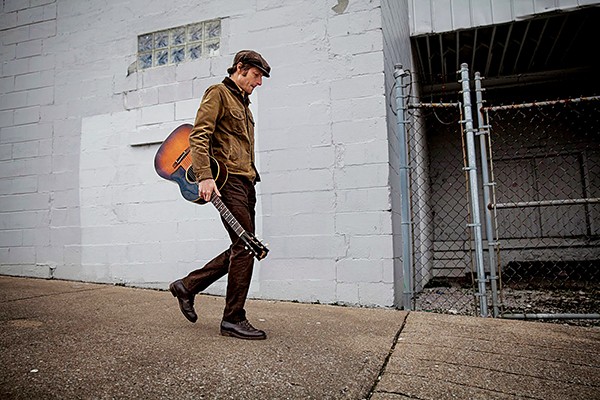When Parquet Courts came through Memphis 16 months ago, the New York quartet had just released their third full-length, Sunbathing Animal, an album that had the band emerging victorious from circumstances that have historically derailed or decommissioned many a popular group. Because Parquet Courts’ second album, Light Up Gold had transformed the band from “unknowns” to “knowns” over the course of the previous year (along with some extensive worldwide road-dogging of their excellent live presentation), the band went into the creative process for their next full-length with all of the stressful baggage associated with a “much anticipated follow-up” album. Up until then, Parquet Courts’ specialty was ragged but airtight noise-pop, with the “pop” meaning “real and big hooks” that weren’t all that noisy, but rather punchy as hell and mixed nice and loud. There was an urgency, brevity, and a favored pace that fell on the faster side of things. But then Parquet Courts branched out sonically and stylistically, without the trappings of what “musical growth” of this nature usually denotes: nap time.
The biographical rundown goes like this: Parquet Courts was formed in 2010 by the songwriting core of Texan transplants Andrew Savage and Austin Brown (both on vocals and guitar) who rounded out the lineup with drummer Max Savage (Andrew’s little brother) and bassist Sean Yeaton. The elder Savage was already somewhat established in the D.I.Y. underground as one half of the duo Fergus & Geronimo, which had recently been put to bed, but not before releasing two full-lengths and several 7-inch records of eclectic, experimental mirth-rock driven by an authentic obsession with Ween. Parquet Courts was to be an altogether different proposition, initially defined by a more rigid stylistic identity, but no less inspired by a life-consuming obsession with exploring the history of underground music.
The quartet debuted with a (very limited) cassette-only album, American Specialties, released by Cut The Cord That … Records in 2011, followed in 2012 by a vinyl version courtesy of Play Pinball! Records. Later, in August of the same year, Andrew Savage released Parquet Courts’ second studio album, Light Up Gold, on his own Dull Tools record label in an edition of 500. Recorded live across three days the previous February, Light Up Gold soon caught the attention of the much higher profile What’s Your Rupture? Records and was rereleased in January of 2013 to a much larger indie-rock/garage-punk/post-punk “underground” that at the time desperately needed a great guitar album such as this one. The king-making gatekeeper contingent of this realm (essentially Pitchfork and the array of similar outlets that don’t quite have the same reach or influence) did the proverbial lowering of its sword to tap Parquet Courts’ shoulder.
Much has been written about Parquet Courts’ assumed and real influences from the ghost of independent underground past and how the band applies it to the right now. Naturally, those ideas are a mix of tardy-to-the-party references that don’t apply at all to the music, or just fail to make sense, and the type of irresponsible cultural rhetoric that doesn’t exactly make one proud to be operating in music journalism.
To this particular writer, Parquet Courts primarily sound and feel like a band from 2015 that’s doing the right thing, with some rearview mirror touchpoints that will always be special, like the Feelies’ 1980 debut album Crazy Rhythms, pre-Document R.E.M., the Wedding Present, the Minutemen, Unrest, Dumptruck’s amazing 1983 debut album D Is for …, and especially the self-proclaimed “Blister Pop” of Midwestern post-punk/post-hardcore outsiders the Embarrassment. Perhaps I’m way off-base, seeing as how none of those bands were from New York, and the general consensus is that Parquet Courts are either the “final great NYC guitar rock band” or the saviors of it, which, let’s be honest, really just means “everyone else says they sound like Television and the Strokes, and they have two interplaying guitarists, so this must be true.” As for the “detached slacker irony” and copious references to Pavement? Check, please.
As Parquet Courts, and under the collaborative offshoot monikers Parkay Quarts and PCPC, a pretty sizable discography has been built since 2011. Andrew Savage is an accomplished visual artist, responsible for the band’s visual presentation, citing the unimpeachable influences of Raymond Pettibon and Ray Johnson. His lyrics reflect inherent wittiness, high intelligence minus pretension, quirk-free charisma, and an excellent taste in reading material that’s exuded from the band as a whole. For lack of a better way to put it, reading these qualities in regard to rock music can signal red flags that are nowhere to be found here.
In the two years leading up to the wide(r) acceptance of Light Up Gold, Parquet Courts honed themselves into a genuine example of a truly fantastic live band. Live performance, while totally negated of any real connectivity in the outdoor festival setting, is an important and final vestige of the “old culture/industry” to survive on its experientially tangible elements, be it an experience with the music on stage, or with a social group, or both. Gimmick-and-tedium-free, Parquet Courts was refined into a great live band, ready for a larger live audience that was, whether they knew it or not, ready for them.
Parquet Courts, Friends of Scotland, Young Mammals, Tuesday, November 10th at the Hi-Tone, 8p.m. $12.
 Danny Kroha
Danny Kroha